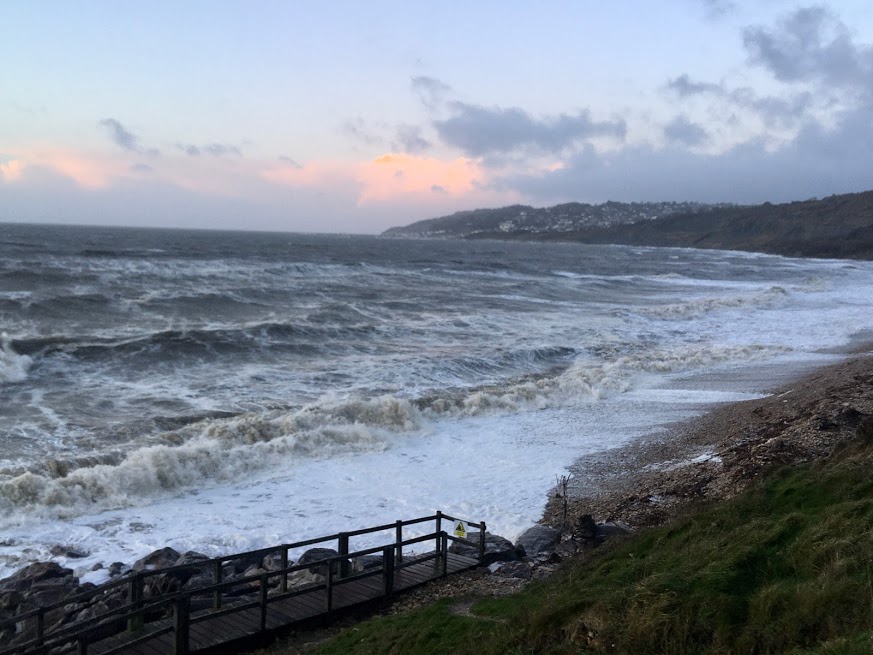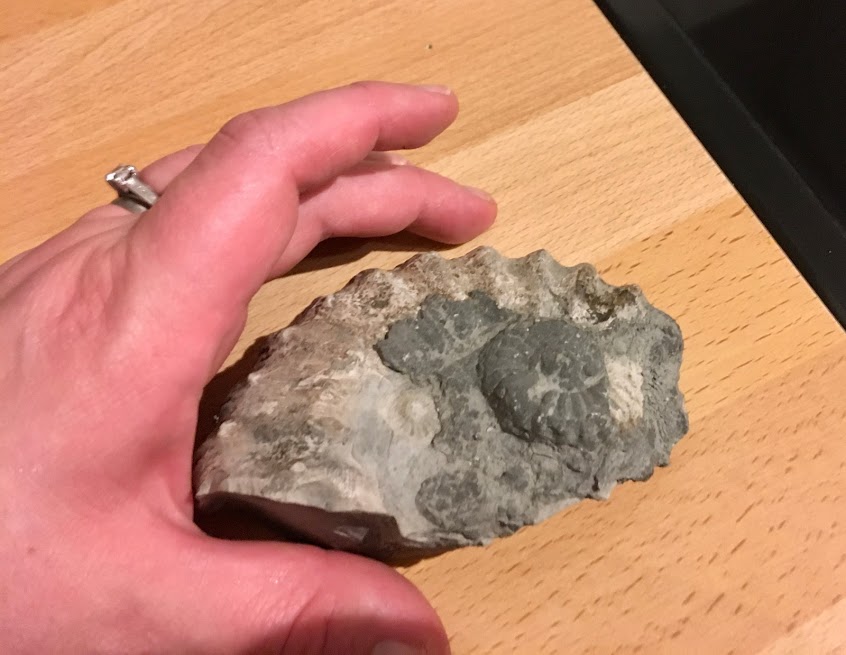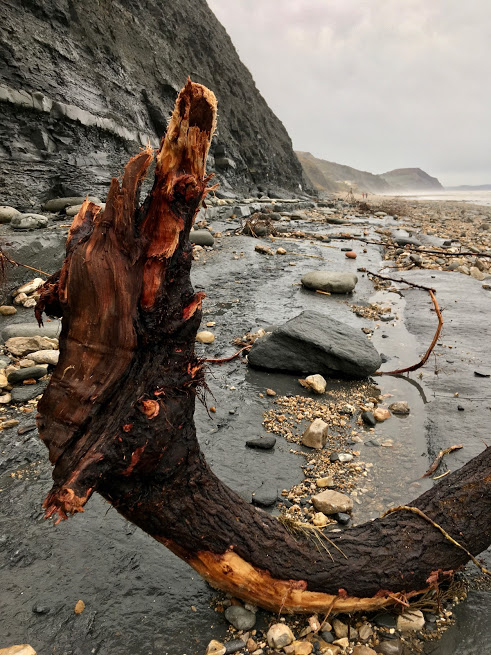This Week’s Bit of String: Ancient cephalopods
Southern England’s Jurassic coastline is made up of cliffs where frequent landslides expose layers of rock and clay studded, sometimes littered, with fossils. One town, Lyme Regis, has 71 noted geological strata, each with its own species of ammonite fossil.
Ammonites are now extinct, but many shells remain, similar spiral shapes to nautilus shells, but ridged. You can find them among the stones and shells and smoothed glass fragments on the beaches of Dorset and East Devon, washed down from the cliffs by the tide, or find their curls poking from clay in the slipped feet of the imposing banks.
I’m quite fascinated by these and other fossils. Prying one out is like finding something from another world. The squid-like creature that lived in this shell might have swum past ichthyosaurs, might have dodged diving pterosaurs. Around 150 million years ago, this was a warm tropical sea near the equator, formed when Pangaea started to break up. The planetary spot they occupied, according to those who study continental shift, is now the location of North Africa. So the clay we slip over, scanning for more fossils, inched up here to make room for ancient Egypt and the skill and culture of the Moors.
We’re talking a very long expanse of time here, obviously. But I love to connect these dramatic pieces and to dwell in the realms of hitherto unimagined change.

This past week I brought my little family, our bubble of three, to the Jurassic Coast and we stayed in a cottage to celebrate my 40th birthday there. I’d long intended to spend this milestone with my whole family in the USA, to party with them for the first time since I turned 23. But that, and Plans B, C, even D didn’t work out, for obvious reasons. Still: I partied, in my own way, by digging in slimy clay, hiking up cliffs in horizontal rain, drinking by the fire with the Lord of the Rings films on (extended versions of course), and sitting on the living room floor playing Monopoly while eating pizza as if at a childhood sleepover.
Sifting Through the Strata
Every life gathers its own layers, detritus packed into sediment, relics peeking from ooze washed down in a storm. When an event shakes us we might discover long-dead remains different in shape to the parts of us now evolved.
As I approached my twentieth birthday, the thought that I could live four times as long depressed me. I felt I’d done enough damage, would only end up dragging everyone down with me. That wasn’t quite the last time I felt that way, but it has been a while, layers of having a kid to adore and a marriage to make thrive and various jobs to pour my energies into and stories to create—these have buried earlier strata which might contain curled, spiny, hard-shelled relics of self-loathing.

You don’t go digging at the bases of the cliffs and you have to watch out for landslides. But if a fragment gets washed out, we might give it a little scrub and find that it has a certain intrigue or even beauty. Remembering what despair feels like is pretty useful for a writer.
This year the stories I’ve most loved writing, and reading when they’re done, are ones featuring children, their belief in magic juxtaposed with intolerance for untruth. I guess that’s what the pandemic and its many separations and fears have shaken loose from me.
I had one character, a teenage skeptic, reply when asked about her goals: “I’m going to refurbish an abandoned shed and call it Burnt Sienna. I’ll live there and do art with a puppy named Periwinkle and a pygmy goat named Ochre.” Sounds appealing, right?
Counting Every Moment
On Halloween, my husband and I watched the Netflix remake of Rebecca. He did a bit of research on the story’s author Daphne de Maurier and informed me Rebecca was her third novel, published while she was 30.
Impressive, we agreed. But then I thought, I’m turning 40 and I’ve written 3 novels. Those were written while working full-time and while being my family’s everything—no nannies or household staff or even local relations. That’s kind of impressive too, and helps me make peace with getting older.

I’ve now been alive for a longer period than the one which separated World War II from my birth. I’ve known my husband for just over half my life. Time is such a funny thing, the weight of it fluctuating vastly depending on what we’re measuring it against. It’s the same with accomplishments; they’ll look more satisfactory from different perspectives.
Not that we want to get too satisfied with ourselves. I was thinking as I pried at prehistoric remains with a stick of driftwood, my face wind-raw and hands clay-chapped, my shoes carrying an extra gallon of water from getting caught in 8-foot swells, “This isn’t meant to be easy, that’s the pride of it.” And even when I managed to free a fragment, when I rinsed it in the frothy waves and was thrilled by the sharp ridges and tight coils revealed, I still didn’t want to stop. It’s like when you write a good story, you still want to dig up a new one and see if it might be even better.
Maybe the best we can wish for, as time passes, is to maintain a desire for more of it. I hope that whatever this year has shaken from the cliffs around you proves useful in your writing, and that you’ve got the strength to keep seeking new challenges.
This story is very seasonal for me as an ammonite is on my Christmas wish list – I have a collection of other fossils, mainly brought to the surface when my father was a miner. Enjoy Christmas and I wish you all a Happy and fulfilling New Year ?